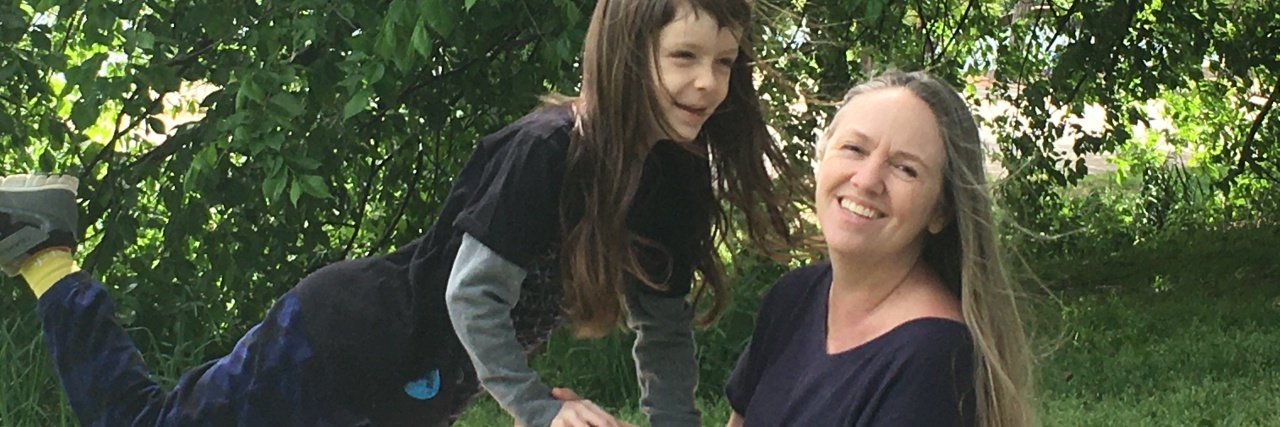We’re in the middle of a global crisis. You’d think us parents could give ourselves a break!
We’ve been tossed into uncharted waters. Even “BC” (before COVID-19) we had plenty to be concerned about as parents. Most of us were expecting too much of ourselves before the virus hit. Working (or worse, out of work) while parenting in isolated nuclear families. There’s a culture of perfectionism pervading modern parenting tied to capitalism, systemic oppression and othering. It can feel stifling to parent in this culture on a good day.
Now, there’s so much more expected of us. It is unsustainable, and everyone knows it. We keep going, because of course we have to. We, too, are essential workers. We may not be risking our lives, but certainly our nervous systems! We know we have been tasked with the impossible. We know we should give ourselves a break. We know that we deserve more support by the wider community. (Why oh why would the economy need bars to reopen before summer camps? How can anyone justify cutting budgets for schools, while tasking them with the impossible?)
Still, self-judgment looms.
What if we were able to develop a sort of friendship with the uncertainty and discomfort we are feeling during the pandemic, and even pass on that skill to our children?
We may be surprised by traumatic childhood memories arising at this time. If that’s the case for you, it is so important to seek help, especially if you are overwhelmed. I did, and it was a blessing, not only for me, but for my family. As I get a hold of myself, accept the situation, and stop before I yell, my family has a chance to get closer through this, rather than torn apart. I’m also forgiving myself completely for all the unhelpful, unconscious choices I’ve made in the past few months. I want to help other parents who are in a similar situation to not only survive, but also find a way to nurture themselves and maintain emotional balance. I want you to have the tools that are helping me remember how resilient I am. I want us all to get through this safely, with our mental health intact. I do my best to own and embrace all of my feelings, even the unpopular ones. Like in Jalaluddin Rumi’s poem, The Guest House, as translated by Coleman Barks:
“This being human is a guest house.
Every morning a new arrival…
The dark thought, the shame, the malice,
meet them at the door laughing and invite them in.
Be grateful for whoever comes,
because each has been sentas a guide from beyond.”
As parents responsible for raising caring and concerned people, the weight of every decision is heavy. The future is uncertain, and difficult to plan for. The lack of control over basic needs can be triggering.
It makes sense that we have evolved as parents to be sensitive, and adapt to threats in our environment. That is how we’ve kept our kids safe for aeons. Here’s an article about the science behind parent’s brains (I sincerely wish the article was less binary, as birthing parents can be of any gender). I try not to reject my anxiety, while also not letting it run my life. We are anxious right now for good reasons! We’re in the middle of an unprecedented global pandemic! We’re also living in a disaster of a culture, which is finally facing its shame of systemically inflicting calculated brutality on Black bodies. Those with intersectional identities have compounded reasons for concern, on a daily basis. There has never been a more crucial time to practice present moment self-acceptance. As we drop our internalized blame and shame, self-compassion frees up our energy to contribute to transformation.
I want to manage my fear enough that I don’t constantly have a knot in my stomach, clenched jaw and jumpy thoughts. I want to catch myself right before I yell at my kid or criticize my husband. I want to have the emotional balance to help others who are suffering. I also want to have access to the other feelings that are present alongside my fear: coziness, hopefulness, courage, trust, grief. They’re all in there together.
The emotions I reject, fester.
My evaluative mind, looming over to judge even my judgement, is exhausting and hard to shake.
There’s a Buddhist concept of the “second arrow“ that I find helpful. The first arrow hurts. The second arrow is our reaction to the first. We can’t always control our external environment from causing harm, but we can control the second arrow.
By judging myself, or getting mad about having uncomfortable feelings, I’m causing myself a second helping of suffering. By worrying about something that may or may not happen, which I can’t control, I’m inflicting myself with discomfort twice, when it may be completely unnecessary.
We are inflicting the second arrow ourselves when others hurt us, and then we feel resentment, doubt or shame. There are more important things to do in this world, than pierce ourselves with the second arrow. We are needed, intact, by our families and our world. What would your life be like if you didn’t believe limiting thoughts about yourself? If you saw your intrinsic value as a parent who is whole, vulnerable, and good enough? If you stopped shooting yourself with the second arrow?
Parenting consciously demands that I examine my deeply held beliefs, and decide how I’ll interact with them.
The self-compassion process called RAIN has been my greatest solace. I learned it from meditation teacher Tara Brach, and it is the one practice where my underlying feelings and needs feel safe enough to show themselves. I coax them gently to the surface, and, rather than trying to dispose of them, I engage in relationship with them. I ask them what they need. Try this when you have a little time. Start with one feeling that you would rather ignore, but is not too triggering. Get physically comfortable. It can help to be guided through the steps at first. See the resources below.
- Recognize: As parents, we sometimes judge ourselves for feeling frustrated or disappointed in our kids. What if we dropped the denial and trusted that whatever is arising, no matter how painful, can serve our growth? Simply name the feeling.
- Allow: Give space to what’s here without trying to fix it or change anything. As a parent, I know that I can jump head first into problem solving in order to make my big feelings go away. I’m not saying to be complacent, just to hit pause. Take a little space, be vulnerable, and accept the truth of the moment without resistance.
- Investigate: Discover more about this feeling. Be curious, and listen to it fully. Ask, where am I feeling it in my body? You can rest a hand where you most feel it. Ask, how old is this emotion? As we raise our kids, we may be surprised by our childhood memories. Ask the place that’s most vulnerable, what do you most need to hear right now?
- Nurture: Give the kindness that this part of you most needs, in order to feel held. If your child were feeling this way, what comfort would you give to them? Listen to your most loving self. Offer, and receive, this care.
- After the RAIN: What would your life be like if you saw your intrinsic value, and honored your whole self, without the need to attack or defend? Who would you be if nothing was wrong with you? How can you just sit with the feeling, with love?
Here’s a podcast I recorded, guiding you through the RAIN process:
ALLOWING YOURSELF TO FEEL HELD.
Here’s a YouTube video, guiding you through the RAIN process:
How to Befriend Your Challenging Emotions With the RAIN Meditation.
Here’s an example of how I use RAIN in my life as a parent:
ON NOT PREFERRING STILLNESS.
We may really want things to be different from how they are, but until we accept the truth of what is in this moment, we will probably be unhappy.
What if we could commit to each other that we will allow our feelings to be here, without evaluating or judging them, even if just for today?
When you’re experiencing challenging feelings like stress or sadness, frustration or doubt, please know you’re not alone. In our culture we may not be used to the idea of befriending our emotions. What we ignore doesn’t go away, it just goes underground. Please allow yourself to be seen in your wholeness, exactly as you are, especially by your family. Our kids need us to show them that we are willing to be vulnerable, in order to transform.
As layers of tension and shame slough off, we feel lighter and more able to access our benevolent qualities. Present moment self-acceptance frees up our energy, so we can ask “How can I serve?” From self-compassion follows compassion for all beings everywhere. As we do this empowering work together, we will embody self compassion, bringing our families and communities together in deeper truth and healing. Please join the Mindfully Parenting Atypical Kids Community Facebook Group and Newsletter for more self-compassion tools, belonging and support.
Photo submitted by contributor.


